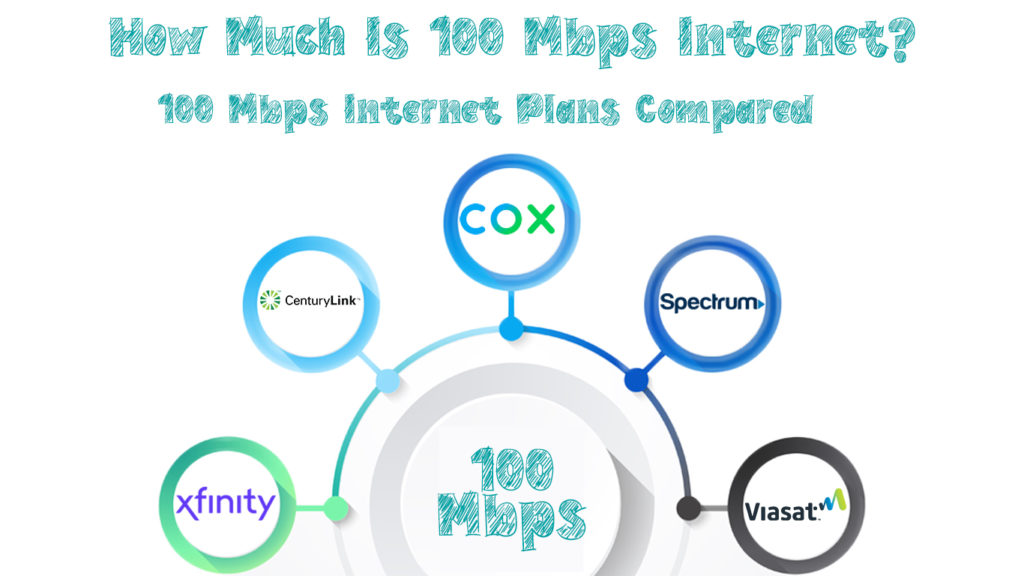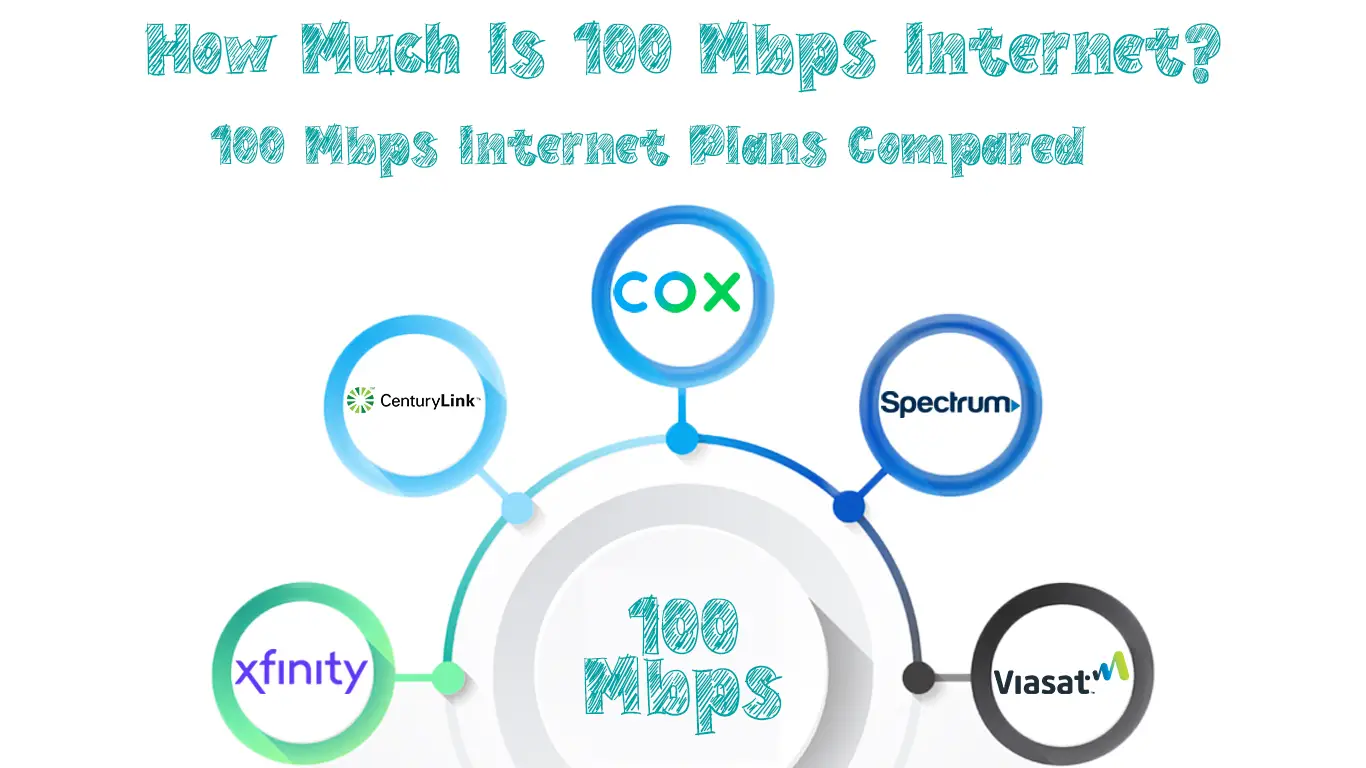An average American spends $64/month on internet bills. Suppose you decided that 100 Mbps is the best speed for your needs and now you want to know how much is 100 Mbps Internet. The price of the internet depends on various factors, such as location, availability, type of internet connection (cable, fiber, satellite, or the traditional DSL). In addition, there are several Internet Service Providers offering various plans, but the costs still differ. Moreover, you might have to pay additional fees, known and hidden.
Let’s look at the options available for 100 Mbps internet. We’d recommend the best plan for three types of internet connection – cable, DSL, and satellite.

CONTENTS
Xfinity Connect More – Best for Cable Internet Connection
Features:
- Widely available
- Low cost
- No data caps
Download speed: 100 Mbps
Price: $40 per month
What is Cable Internet?
In terms of wide availability, cable internet appears to be one of the fastest internet connections in the US. Using the infrastructure similar to cable TV, a lot of cable TV firms also offer cable internet connection in a bundle. They took advantage of the fact that 88% of Americans have already subscribed to cable TV to bundle this service with internet plans.
We’re recommending this 100 Mbps Xfinity plan, but you should be aware that cable internet can actually provide much faster download speeds (over 1 Gbps). While not as fast as the fiber internet, many users choose cable internet because it’s fast and widely available.
In addition, it’s a lot faster than the traditional DSL internet connection. Moreover, it’s pretty easy to self-install all the cable internet equipment (cable modem and a router).
Cable Internet Explained
Pros and Cons
Pros
- Widely available – cable TV and internet have been around for many years, and they have established cable networks all over America. Therefore, starting a new connection is super easy since you don’t have to lay up a brand-new cable network.
- Cable internet can give super-fast download speeds up to 1,000 Mbps, which is a lot faster than a DSL connection and comparable to fiber internet.
- Internet plus TV bundle deals – since cable internet can make use of the existing cable TV network and infrastructure, cable companies usually offer a variety of attractive bundle deals that include cable internet and cable TV plans.
Cons
- Tend to get congested when there are too many connected online users, especially in the evening when everyone is getting online. However, cable ISPs can fix this problem by adding more nodes to the congested neighborhood to ease up the web traffic.
- Upload speeds are not as good as expected, but most users do more downloads than uploads.
CenturyLink Simply Unlimited Internet – Best for DSL Internet Connection
Features:
- Widely available
- No data caps
- Slower speed
Download speed: 100 Mbps
Price: $50 per month
What is DSL Internet?
DSL delivers internet connection via the existing telephone lines. However, unlike the more traditional older dial-up connection, it doesn’t share the same line as the telephone. Thus, it can deliver a much faster internet connection. Although the speed is not as fast as the cable and fiber connection, it’s still useful for basic internet usage such as emailing and web browsing. With a low-cost offering, it’s still a popular choice for some low-end online applications.
Pros and Cons
Pros
- Widely available – 90% of the population has access to a DSL network. In some rural areas, DSL is the only connection available.
- Affordable – it’s cheaper than other types of connection providing the same internet speed, especially in rural areas. For instance, a satellite internet connection can triple the cost of a DSL plan.
Cons
- Slow speeds – it’s one of the slowest internet connections. In addition, upload speed is slower than download speed, making specific online applications such as video conferencing impossible.
- Local monopolies – you only have little choice since not many DSL operators can be present in certain regions.
- Deteriorating infrastructure – the copper-wired networks are aging and could not keep up with the fast-developing new technologies.
Features:
- Wide coverage area
- Unlimited data
- High-end technology
Download speed: 100 Mbps
Price: $149.99 per month
What is Satellite Internet?
The connection is possible via an orbiting satellite. One obvious advantage of the satellite connection is that you can get the connection wherever you go without depending on the physical cable networks. However, you can only receive the signals via a small dish installed on your house.
Satellite Internet Explained
Pros and Cons
Pros:
- Widely available – you can receive signals wherever you are since they transmit via the open sky from the satellites. There is no need for physical cable infrastructure to run underneath the ground or via transmission towers. All you need is a clear sky and an open space to mount your satellite dish.
Cons:
- Slow speeds – since the signal is transmitted through the air using radio frequencies, there are some limitations when it comes to max achievable speeds. Also, the speeds are not consistent because they depend on so many factors.
- Restrictive data caps – although you subscribe to an unlimited data plan, your ISP will reduce the speed once you reach a certain data limit.
- High latency – due to the long distance from the internet source, i.e., the satellite orbiting in outer space, satellite internet has a much higher latency than any other connection type. Therefore, it’s not recommended for online games and similar real-time online applications.
What to Consider When Buying Internet
You’d probably look at the price and speed when shopping for the best internet plan for your needs. However, there are also various other factors you can look at. Here are some of the things you should consider when choosing an internet service.
- Internet connection type – DSL, Cable, Fiber, or satellite
- Extra costs – sometimes you have to pay for the installation, equipment costs (router/modem), and additional fees.
- Data caps – Some ISPs impose data caps on all plans. Some will have data caps for cheaper plans, while the faster and pricier plans are unlimited. Some ISPs don’t have data caps at all.
- Annual contracts – it’s the ISP’s strategy to maintain its customer base, but most ISPs don’t require you to sign a long-term contract.
Conclusion
In this post, we have listed one plan for three types of internet connection providing a speed of 100 Mbps. This should help if you’re trying to figure out how much is 100 Mbps Internet.
In addition, we have also given an overview of each type of internet connection so that you could understand the pros and cons of each type. Therefore, it should be easier for you to decide what 100 Mbps plan suits you best.

Hey, I’m Jeremy Clifford. I hold a bachelor’s degree in information systems, and I’m a certified network specialist. I worked for several internet providers in LA, San Francisco, Sacramento, and Seattle over the past 21 years.
I worked as a customer service operator, field technician, network engineer, and network specialist. During my career in networking, I’ve come across numerous modems, gateways, routers, and other networking hardware. I’ve installed network equipment, fixed it, designed and administrated networks, etc.
Networking is my passion, and I’m eager to share everything I know with you. On this website, you can read my modem and router reviews, as well as various how-to guides designed to help you solve your network problems. I want to liberate you from the fear that most users feel when they have to deal with modem and router settings.
My favorite free-time activities are gaming, movie-watching, and cooking. I also enjoy fishing, although I’m not good at it. What I’m good at is annoying David when we are fishing together. Apparently, you’re not supposed to talk or laugh while fishing – it scares the fishes.

